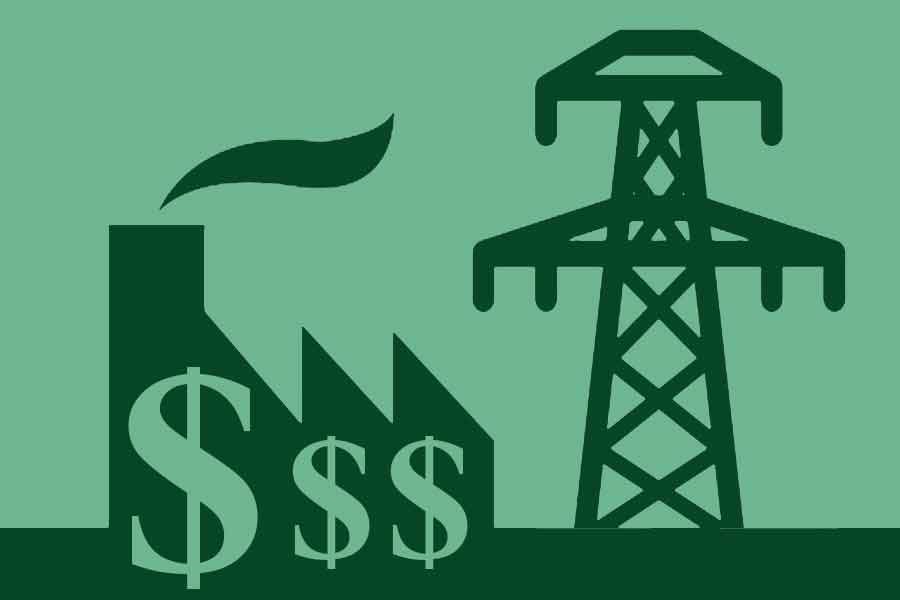The state of the country's foreign exchange reserve usually holds the centre stage in most of the discussions about the country's economy these days. With a multitude of contentious issues going around and international financial institutions disputing government figures, a smokescreen is created at times. In the midst of all this comes the news that Bangladesh is counting the cost of penalty payment to foreign suppliers of energy resources. It appears, as the lead news published in this newspaper on January 11 shows, particularly as a sore point.
That the government has not been able to make regular payments on LNG (liquefied natural gas) shipments on more than one occasion is a cause for worry about the state of finances. This comes from the dollar crunch that is haemorrhaging the economy and has resulted in drastic reduction in import of raw and finished materials/goods that is adversely affecting every sector of economy. Yet, Bangladesh is bound to make a large payment in dollars to different suppliers of energy every month.
If one looks at the two FSRUs (floating, storage, re-gasification units) in operation, the financial pain becomes very clear. The penalty payments are "demurrage for payment delays against LNG import and less-than-agreed re-gasification of the liquid gas in two offshore units under private sector". What is amply clear from the report is that long-term LNG suppliers are being paid to the tune of US$160-200 million (every month), while FSRU owners are being paid US$7.80 million as "extra" payment (as capacity payment for having failed to utilise the FSRUs - as per contract), since Petrobangla could not make payment on time. No use complaining now, since that is the way the contracts have been signed. A "deal is a deal" and contractual obligations will have to be abided by. According to Petrobangla data, "currently re-gasifying around 421 million cubic feet per day (mmcfd) of liquefied natural gas from the two LNG-import terminals, leaving 57 per cent of the capacities of the FSRUs unused" - and the 57 per cent unutilised capacity are what is costing the national exchequer $7.8 million in payment, in foreign exchange. To add salt to injury, both these FSRUs (one owned by a US company, the other by a large conglomerate in Bangladesh) are enjoying the added benefit of waivers on VAT, advance tax and supplementary duty on products and services in relation to FSRU operations (according to the NBR). It would be interesting reading if the data were available at hand on these cash flows that NBR is deprived of.
If one breaks down the data that are available, the Petrobangla's agreements with these two companies for the re-gasification of LNG may serve as an eye opener. An amount of $450,000 is paid by Petrobangla to LNG-terminal owners "to re-gasify up to 1,000 mmchfd LNG from two units". The foreign company is paid approximately $237,000 and the Bangladeshi company, $217,000 per day. As stated before, failure to re-gasify (regardless of the amount re-gasified) results in capacity payment to these companies. The agreed quantity for re-gasification is 500 mmcfd.
These agreements that have been made are a classic case of unprofessionalism. That our authorities have failed to follow the basics involved with contracts management is once again clear. The contracts tend to protect the interests of the contracted parties, not of the State. What on earth prompted the government to agree to clauses in the agreement that would result in such terms of payment remains a mystery. Energy experts have termed these agreements to be an exercise in how NOT to negotiate deals. What is evident is that we have serious lacking in contract management / negotiation skills. Yet, the country is forging ahead with multi-billion dollar deals with foreign contractors for infrastructure development.
Now that those energy deals are signed and sealed, a pattern begins to emerge as to why the government is continually revising energy prices upwards. Unfortunately, that is not going to bring in the desired results. Keeping aside the arguments of a raise in energy prices resulting in increasing cost of production and ultimately retail prices, the fact is that upward (revised) price of energy at domestic level is paid in BDT, not US$. Hence, the pressure on the foreign exchange reserve stays where it is. The country continues to bleed on account of payment in precious forex for "non-compliance" on our part, due to ineptitude. The much-needed imports (for the rest of the economy) keep getting delayed. This haemorrhaging needs to stop somewhere. The answer lies with the authorities. Having laid off plans to develop own natural resources and now bleeding through the nose in making payments (for not importing required energy), the authorities find themselves into a corner. Finding an escape route is not easy but it has to be found in order to stop the economic bleeding.


